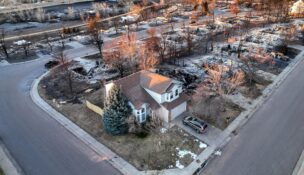Navigating Denver’s New Rental Licensing Program: Impact and Insights for Landlords and Tenants
Balancing property standards and costs — a closer look at Denver's new regulatory landscape for rentals.
Margaret Jackson //April 5, 2024//


Navigating Denver’s New Rental Licensing Program: Impact and Insights for Landlords and Tenants
Balancing property standards and costs — a closer look at Denver's new regulatory landscape for rentals.
Margaret Jackson //April 5, 2024//
People who own rental properties have mixed feelings about Denver’s new rental licensing program.
On one hand, they appreciate the program’s intent of ensuring apartments and single-family rental units are fit for people to live in. On the other hand, they worry about added expenses, with some calling it a “money grab” for the city and county of Denver.
Annie Zook, who owns nine rental properties in North Denver, has had her properties inspected and is waiting for her applications to make their way through the process. Although the inspections didn’t turn up any issues she would have had to spend money correcting, Zook doesn’t think the program is necessary.
READ: Maximizing Investments — Harnessing Data-driven Real Estate Strategies
“I think the whole thing is missing the point,” she said. “These are our properties, and this is our retirement income. Why would we want to have a bad property? It’s in my best interest to have a safe place.”
Zook worries that the program will make renting more unaffordable for younger people who already are struggling.
“Young people move to Colorado because they want to ski and smoke weed, and they can’t afford stuff, and unfortunately, our city is building high rises no one can afford,” she said.
It was the process that made Ann Hershfeldt, who owns one rental property in Potter Highlands, nervous. She worried it would take a long time to get an appointment for an inspection. “It sounded like a nightmare process, so I was a little nervous,” Hershfeldt said.
But she was pleasantly surprised. Although she’d heard there weren’t enough inspectors and she’d have to wait her turn, she was able to get one quickly. Although she was worried the inspector might find issues in her rental home, which was built in 1948, he didn’t discover anything wrong with it.
“It was very easy, and the things I was worried about were not an issue,” Hershfeldt said. “The house is just old enough to make me worry, and it’s stuff you can’t help because it’s an older house.”
In all, the inspection took about 15 minutes. Hershfeldt said that newer buildings likely won’t have any issues, and that it’s the older buildings the city should focus on. She also said that for the program to have a real impact, it should be implemented statewide rather than limited to Denver.
“They want people living in houses that meet standards,” she said. “It just seemed to me that it’s a little too simple.”
The first stage of residential rental licensing went into effect on Jan. 1, 2023, when multiunit properties were required to be licensed. As of Jan. 30, 5,330 multi-unit properties had been licensed through the program.
The second phase of the law requiring all single-unit rental properties to be licensed took effect Jan. 1. As of Jan. 30, 8,740 single-unit properties have been licensed.
It takes an average of about a week for each landlord to complete the licensing process, which includes hiring an inspector and submitting proof their property has passed an inspection. Processing the application can take up to 30 days.
“People paying thousands of dollars a month should have operating heat and other minimum housing standards,” said Molly Duplechian, executive director of Denver Excise and Licenses.
The licensing fee for a single-unit dwelling is $50; $100 for two to 10 units; and $250 for 11 to 50 units. For buildings with 51 to 250 units the fee is $350, and for 150 or more it’s $500. Licenses are valid for four years.
Tenants who suspect that their landlords haven’t gotten a rental license can file an online complaint with the city.
READ: 7 Tips for Reducing Tenant Turnover
“As our enforcement team continues to search for unlicensed properties, we believe this tool will help the city increase our licensing compliance rate and achieve the public health and safety goals of this important licensing requirement,” Duplechian said.
Tenants can also call 311 to lodge a complaint about an unlicensed rental property.
Inspections range from $200 to $300, depending on the size of the property and how many units are being inspected.
When the city identifies an unlicensed property, it sends a notice of violation warning letter informing the landlord that they will be fined in about 30 days if they don’t apply for the license. So far, the city has sent out 1,880 violation letters to landlords without the required licenses.
Landlords who don’t comply receive a first fine of $150, a second fine of $500 and a third fine of $999 that the city can send every day for a landlord operating without a license.
“The city is taking strong enforcement action against unlicensed residential rental properties in our effort to make rental properties safe,” said Eric Escudero, communications director for Denver Excise and Licenses.
But just how does the department discover landlords who haven’t complied with the new law?
“The first place we go to is tenants who have filed a complaint with the health department,” Duplechian said. “We’ll work with them to look at whether they’re licensed or not. Then they’re on our radar.”
The department also has a software program it uses for short-term rental licensing. “It scrubs the internet for different websites and looks at listings and advertisements,” Duplechian said. “That’s very helpful technology.”
The new program has been a boon for inspectors, who have seen their workload slow as homebuyers sit on the sidelines waiting for mortgage interest rates to drop.
READ: 10 Easy Ways to Upgrade Your Rental Property
“Residential inspections are down about 75%,” said Greg Goodman of Inspections Denver. “It’s been a blessing in disguise. The rental inspections have filled the void.”
The city provides a checklist of 25 criteria a property must meet before it receives a license. The checklist covers everything from properly working toilets and location of the water heater to lighting of halls and stairways and properly installed outlets and fixtures.
Although his primary business is home inspections of for-sale properties, Jordan Van Voorst of Checkup Property Inspections said he’s performing five to six rental inspections weekly.
The criterion for rental property is slightly different than for property the owner lives in, Van Voorst said. For example, on rental properties, GFCIs are only required in the bathroom, but in an owner-occupied property, they must also be installed in the kitchen.
The rental program also requires one smoke detector for each bedroom, and a fire extinguisher must be on the property.
Even so, Van Voorst said about 70% of the rental properties he’s inspected don’t have issues. “I’m sure there are horror stories out there, but most of the properties that I inspect are in pretty good shape,” he said.
t
























